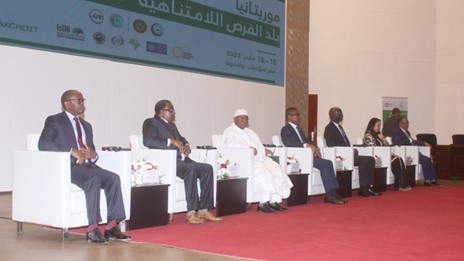
ICPSD Contributed to ICDT Invest Days – OIC Mauritania Investment Forum
“The majority of impact capital is concentrated in developed countries and does not reach developing countries, where impact capital is most needed. Therefore, there is a mismatch between the current geographical distribution of capital flows and the need for impact capital. The demands and interests of impact investors are not directed at the regions and countries where they should ideally be located”, stated Mr. Sahba Sobhani, Director of the United Nations Development Programme (UNDP) Istanbul International Center for Private Sector in Development (ICPSD) at the ICDT Invest Days, OIC-Mauritania Investment Forum in Nouakchott, Mauritania.
On 15-16 March 2023, the Mauritanian Government, through the National Agency for Investment Promotion of Mauritania (APIM) and the Islamic Center for Investment Development (CIDC), organized the second edition of the Islamic Centre for Development of Trade (ICDT) Invest Days. The International Conference Center of Nouakchott (CICN) hosted this event on the sidelines of the 49th session of the Council of Foreign Ministers of Organization of Islamic Cooperation (OIC) Member States. The meeting was part of a cycle of business events focusing on the Mauritanian capital. It created a platform with the aim of attracting foreign investment to Mauritania, promoting investment opportunities, and facilitating partnerships between the private sectors of the OIC member states.
The event was supported by UNDP, which has been working with the OIC to foster economic growth in member states. The UNDP’s role was to facilitate discussions among participants and help identify investment opportunities that align with the OIC’s priorities, such as sustainable development and poverty reduction.
The event participants stressed on the importance of Islamic finance in diversifying Mauritania’s financial services supply. The country must, however, find a sustainable growth model that will enhance access to financial services for those businesses and individuals otherwise excluded from the financial system. To achieve this, a holistic intervention approach is needed, including strengthening capacity with blended finance, enhancing access to finance with guarantees for development, financing local investments and SMEs, financing sustainable development with Green Sukuk, and implementing financial tools to manage vulnerability.
The forum developed key recommendations that can be implemented by the country as a roadmap for developing further policy agendas. These include identifying a pipeline of innovative sustainable projects, developing long-term strategies and medium and short-term plans for project implementation, developing Shariah-compliant contracts for infrastructure projects, and building capacity and human capital for implementing Islamic infrastructure and financial solutions.
During the event, Mr. Sahba Sobhani, highlighted the ICPSD’s efforts to expand the contributions of Islamic finance to sustainable development. He presented a two-year MOOC project, which was developed by the ICPSD in partnership with the IsDB’s Science, Technology and Innovation (STI) Fund-Engage Platform, the Islamic Development Bank Institute (IsDBI), and Durham University Business School between 2020 and 2022. The course is now available as a self-paced online certificate program on edX and the UNDP Learning for Nature Platform, published in August 2022.
The MOOC project offers a flexible and accessible way for interested individuals to learn about Islamic finance’s role in sustainable development, regardless of their location or educational background. It aligns with the UNDP’s commitment to promoting inclusive and sustainable development through capacity building and knowledge sharing.
Mr. Sobhani also highlighted the extended geographical reach of UNDP ICPSD in Europe, Central Asia, the Middle East and North Africa, as well as Asia Pacific and sub-Saharan Africa, assisting a variety of countries with financing efforts for the Sustainable Development Goals (SDGs). It works on various projects and programs, such as the development of green hydrogen infrastructure, the Green Sukuk initiative, capacity building in Islamic finance and impact investment, as well as the UNDP and IsDB’s joint initiative of Global Islamic Finance and Impact Investments Platform (GIFIIP) which aims to enhance knowledge aspects in the Islamic finance sector.
Within its global outreach, ICPSD offer various knowledge products including the SDG Investor Map, a market intelligence tool for investors to make data-backed investment decisions in SDG-anchored business areas. ICPSD has provided implementation support for the Map to 8 countries from Africa, out of 15 countries in total, to identify scalable investment opportunity areas (IOAs) for advancing the SDG achievement. As Mr. Sobhani has showcased a selection of IOA examples identified across Sub-Saharan Africa, the Map could draw attention to green and SDG-factored investment opportunities in Mauritania to attract private impact capital. Mauritania offers many opportunities for green investments aligned with the SDGs and the Strategy for Accelerated Growth and Shared Prosperity (SCAPP) 2016-2030 adopted by the Government. Agriculture and livestock value chains, fisheries and energy sector are at the forefront of promoting inclusive and resilient growth in the country. Regional initiatives, including the ambitious Great Green Wall, and Desert to Power, are a testimony to Mauritania’s potential to green its economy through a flourishing sustainable economy in Sahel.